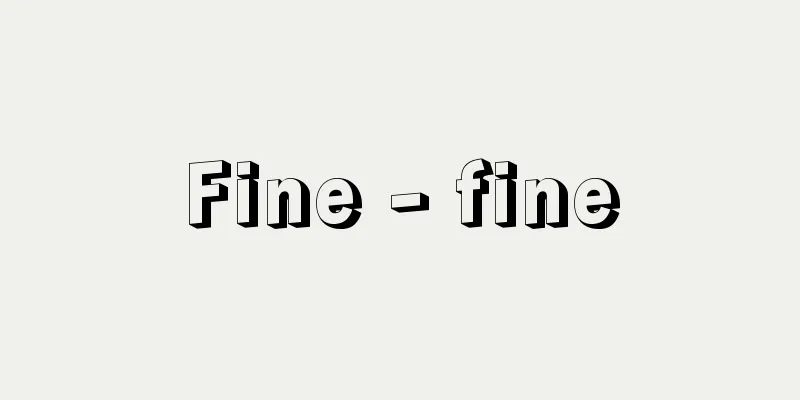Fine - fine

|
A monetary penalty imposed by the state or a public organization on citizens other than a penalty under the Criminal Code. To distinguish it from a penalty, which is a type of penalty, the latter is sometimes called a "togaryo" and a non-penal fine is sometimes called an "ayamachiryo." Because a non-penal fine is not a criminal penalty, it is not subject to the general provisions of the Criminal Code, and there are no general principles regarding it. There is no equivalent to a statute of limitations for prosecution or a criminal offense. Thus, although non-penal fines are different in nature from criminal penalties, it is said that legal provisions regarding the cases in which criminal penalties and non-penal fines should be imposed are not necessarily uniform. Moreover, there are a great many provisions regarding non-penal fines, and although their nature is diverse, they can generally be divided into the following three types. (1) Fines as disciplinary punishments These are imposed when a person in a certain occupation or position violates the obligations of his/her job. Examples are found in Article 80 of the Notary Public Law and Article 2 of the Judges Disciplinary Law. These are imposed by the supervisory authorities. (2) Fines as enforcement penalties: This is one of the administrative enforcement measures, and aims to make the obligor fulfill his/her obligations of his/her own accord by informing them that a certain fine will be imposed if the obligation is not fulfilled within a certain period of time, thereby exerting psychological pressure on the obligor. Before the Second World War, this was generally recognized under the Administrative Enforcement Law, but after the war, it only remained in the form of a missed provision in Article 36 of the Erosion Control Law, and it is said that it has never been used. However, the provision that imposes a fine of 100,000 yen per day that increases until the obligation is fulfilled on those who violate a court order to follow the Labor Relations Commission's order (Article 32 of the Labor Union Law) is a type of enforcement penalty. There have also been proposals to introduce this as an indirect enforcement method for violations of the Building Standards Law, but this has not been adopted. (3) Fines as punishment for public order These are imposed as sanctions on those who violate laws and regulations in order to maintain law and order. They are widely seen in various fields, as follows: These are sanctions imposed on those who violate orders or prohibitions to maintain order in private law. They are found widely in the Civil Code, Commercial Code, Companies Act, Family Registration Act, etc. It is imposed as a sanction for violating orders or prohibitions related to legal proceedings. It is stipulated in the Civil Procedure Code, the Criminal Procedure Code, the Civil Mediation Act, the Law Concerning Maintenance of Order in Courts, etc., and the Domestic Relations Proceedings Act. Furthermore, local governments may impose fines for violations of ordinances and rules enacted by the mayor (Local Autonomy Law, Article 14, Paragraph 3 and Article 15, Paragraph 2). The procedure for imposing fines is based on the Non-Contentious Cases Procedure Law unless there are special provisions. Fines stipulated in the ordinances and rules of local governments are imposed by the head of the local government after a defense procedure (Local Autonomy Law, Article 255-3), and can be collected from those who do not pay them in the same way as for local tax delinquency procedures (Local Autonomy Law, Article 231-3). [Yasuhito Abe] [Reference] |Source: Shogakukan Encyclopedia Nipponica About Encyclopedia Nipponica Information | Legend |
|
国または公共団体が国民に対して科する金銭罰で、刑法上の刑罰以外のもの。刑罰の一種である科料と区別するため、科料を「とがりょう」とよび、過料を「あやまちりょう」とよぶことがある。過料は刑罰ではないから、刑法総則の適用はなく、これに関する一般原則の定めもない。公訴時効や刑の時効に相当するものもない。このように過料は刑罰と性質を異にするものの、いかなる場合に刑罰を科すか、過料を科すかについて法律の規定はかならずしも統一的ではないといわれる。しかも、過料の規定はきわめて多く、その性質は多様であるが、一般に次の3種類に分けられる。 (1)懲戒罰としての過料 一定の職業ないし身分にある者が職務上の義務に違反した場合に科せられる。公証人法第80条以下、裁判官分限法第2条に例がある。監督官庁がこれを科する。 (2)執行罰としての過料 行政上の強制手段の一つで、一定の期間内に行政上の義務の履行がない場合に一定の過料に処すべき旨を予告し、それによって心理上の圧迫を加え、もって義務者に自らその義務を履行させることを目的とする。第二次世界大戦前は行政執行法により一般的に認められていたが、戦後は砂防法第36条に条文の整理漏れの形で残っているだけで、用いられたことはないといわれる。ただ、労働委員会の命令に従うべき旨の裁判所の命令に違反した者に対し、履行するまで1日10万円ずつ増えていく過料を科すとの規定(労働組合法32条)は一種の執行罰である。また、建築基準法違反の間接強制方法として導入せよとの提言があるが、採用されていない。 (3)秩序罰としての過料 法律秩序を維持するために法令に違反した者に制裁として科せられる。次のように広く各分野にみられる。 私法秩序を維持するための命令・禁止に違反した者に制裁として科せられるもの。民法、商法、会社法、戸籍法など広く散在する。 訴訟手続に関する命令または禁止に違反したことに対する制裁として科する。民事訴訟法、刑事訴訟法、民事調停法、法廷等の秩序維持に関する法律、家事事件手続法などに規定がある。 さらに地方公共団体は条例違反、長の制定する規則違反には過料の規定を置くことができる(地方自治法14条3項、15条2項)。 過料を科す手続は特則がない限り非訟事件手続法による。地方公共団体の条例・規則で定める過料については地方公共団体の長が、弁明手続を経て(地方自治法255条の3)科し、納付しない者からは地方税の滞納処分の例により徴収することができる(同法231条の3)。 [阿部泰隆] [参照項目] |出典 小学館 日本大百科全書(ニッポニカ)日本大百科全書(ニッポニカ)について 情報 | 凡例 |
Recommend
Short-term active duty soldier - Tankigen Ekihei
The military service privileges for graduates of n...
Nicholas [I] - Nicholas
Russian Emperor (reigned 1825-1855). Son of Paul I...
Chibcha - Chibucha (English spelling)
When the Spanish arrived in the Americas in the 1...
Uri-ko-kin - Kashiko
...The fruit is a heart-shaped, flat capsule cont...
Golden Age
This is the period when Spanish literature was at ...
electronic pop music
...However, their activities, which seemed to be ...
Lady Chapel (English spelling) Lady Chapel
…Since the Romanesque period, many English cathed...
Water caressing - Omizu-nade
…In Okinawa, a pig is killed at the end of the ye...
Virtual machine
In computers, the actual physical structure of the...
Anise oil - anisuyu (English spelling)
An essential oil. Also called aniseed oil. When t...
Yoshiro Nagayo
Novelist and playwright. Born on August 6, 1888 i...
Alps [mountain range] - Alps
The largest mountain range in Europe, stretching f...
Syringa microphylla (English spelling)
…[Hiroshi Aramata]. … *Some of the terms that ref...
Yuan Yong An - Yuan Yong An
…Chinese military and politician. Born in Xiangch...
Kikujutsu
Ki means "bunmawashi" (a circular movem...








![Komochi [village] - Komochi](/upload/images/67cb9c2c62dd0.webp)
